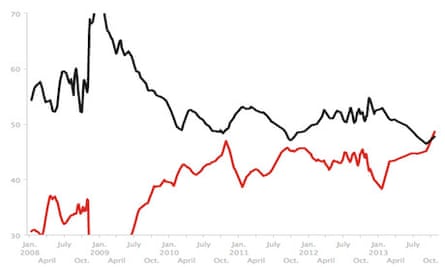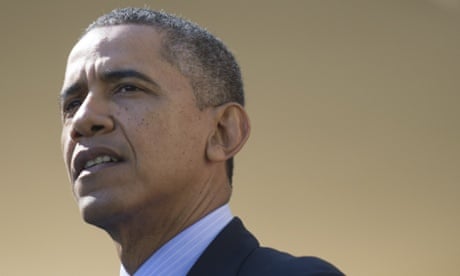Much attention has been paid to what effect the shutdown fallout has had on Republicans. It's really not hard to see congressional approval dropping to all-new lows, a Republican brand tumbling ever lower, and national House ballot polling that should worry Republicans at least a little ahead of next year's midterms. Little, though, has been said about how the shutdown has affected President Obama's brand.
At first glance, Obama seemed to emerge from the shutdown unscathed. His approval rating, while poor, hasn't moved much since the middle of August – before the lead-up to and the shutdown itself. Per the Real Clear Politics average, Obama has had about a net -7pt approval rating since the middle of August. As of this writing, he stands at -6.5pt.
This approval rating is actually better than it was during the debt ceiling debate of 2011. Back then, President Obama was averaging a net approval rating between 8pt and 9pt.
I would argue, however, that the shutdown has had a negative impact on the president's brand. Like any successful politician, Obama has benefitted from being well-liked. Remember, approval polling asks whether people approve or disapprove of the president's job performance; favorable polling simply asks whether people have a positive or negative view of the president.
So, with Obama, even as his approval rating has dropped in the past, he has been able to maintain a positive net favorable rating. It was one his strengths against Mitt Romney in 2012.
The latest HuffPollster aggregate (with only live interview polls that call cellphones) has his favorable rating below his unfavorable for the first time in Obama's presidency: 48.6% of Americans hold an unfavorable view of the president, while 47.7% hold a favorable view. The Real Clear Politics average shows the same thing.
This is the first time President Obama has been in negative net favorable territory.
When we look at the chart, we can see what happened.

Obama's unfavorable rating was on an upward track in recent months, but has seen a sharp uptick over the shutdown. Then came the threat of a shutdown. His unfavorable rating (in red) has gone up about 3pt. So what does this mean?
First and foremost, I'd call it a psychological blow. The electoral difference for the president's party in midterms between a president's net favorable rating at +1 or -1pt isn't much. Still, you'd want to be able to say that more people like you than don't.
Second, it confirms that the matchup between Obama and Congress remains one between two opponents neither of whom the American people much like. Congress and Republicans are hated right now, but Obama can't really claim any sort of high ground. The best he could say is that he's not as far down as the other guys.
Third, there isn't much proof that favorable ratings are any more important than approval ratings in midterm elections. We only have a sample size of nine since favorable ratings were first asked in the 1978 midterm elections. What can be said is that a variable that averages both net favorable and approval ratings seems to do a slightly better job of predicting midterm House elections than one that just has one of the variables. A president's party obviously benefits from a higher presidential rating.
Four, a term-limited president's net favorables seem to better predict the outcome of the next presidential election than approval ratings. Again, we suffer from a sufficient sample size with only three of these elections in the past 40 years, but think of Bill Clinton and George W Bush. Clinton's net approval rating of +20pt in 2000 should have meant an easy win for Al Gore. The problem is that his net favorable rating was hovering around or slightly below zero.
In other words, voters liked Clinton's presidency just fine; but back then, they didn't like him. This is probably why Gore was hesitant to use Clinton in the campaign.
For Bush in 2008, his net favorable of -30pt was quite bad. It wasn't nearly as poor, however, as his net approval rating of nearly -50pt. Obama's 2008 moderate-sized win of 7.3pt resembles more of what you'd expect in an environment that gives a president a -30pt net favorable than a -50pt net approval rating.
So, if President Obama's current negative net favorable holds, it puts the 2016 Democratic nominee at a distinct disadvantage.
Overall, the shutdown does seem to have had an effect on President Obama: while his approval rating has stayed fairly steady, his net favorable has dropped to the lowest point in his presidency. Obama's net favorable may not be as bad as congressional Republicans, yet history suggests that it's poor enough that it should be troubling for the president and his party.
